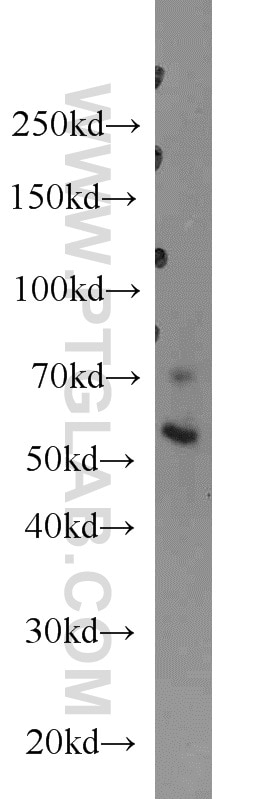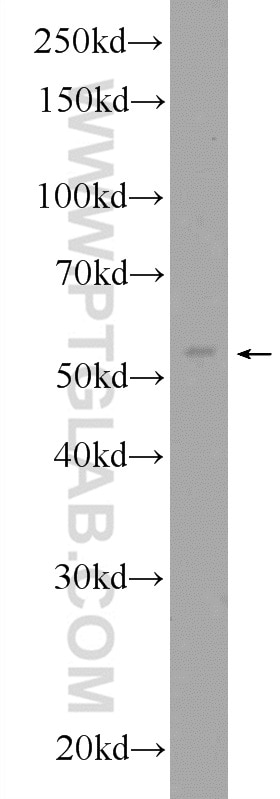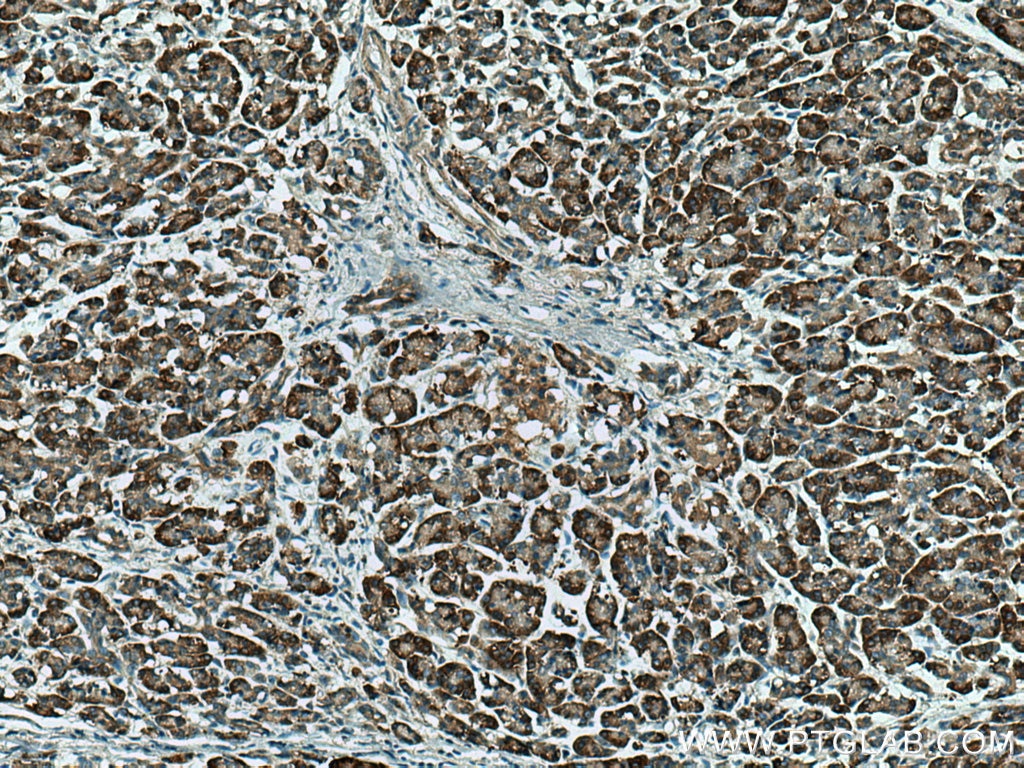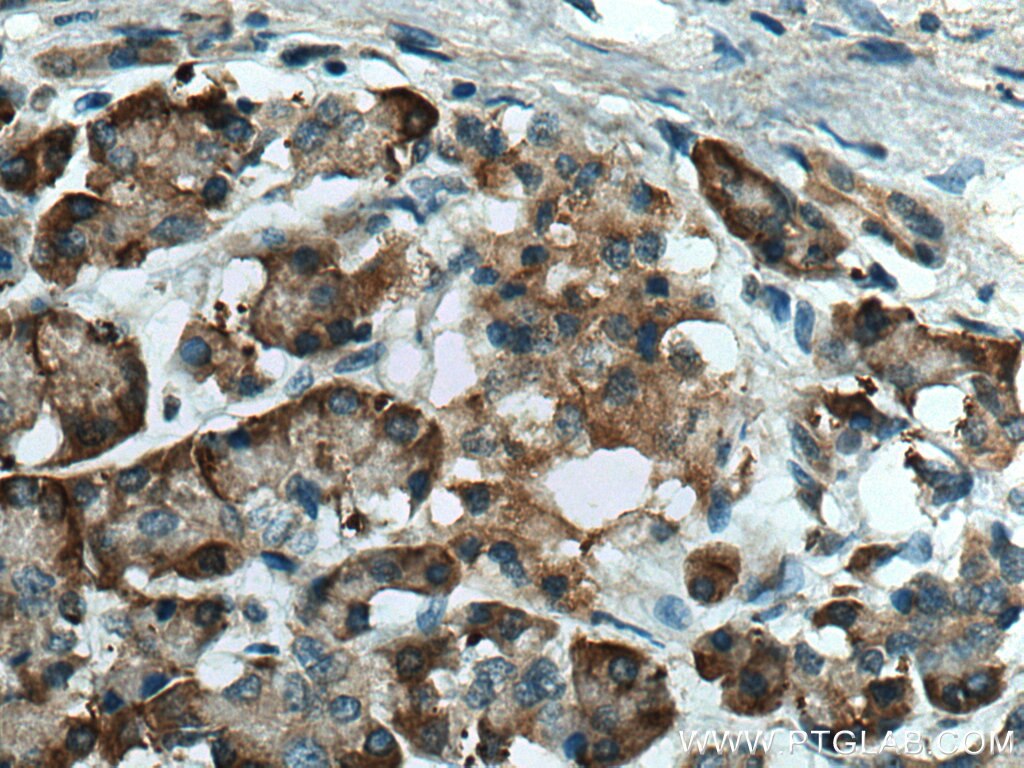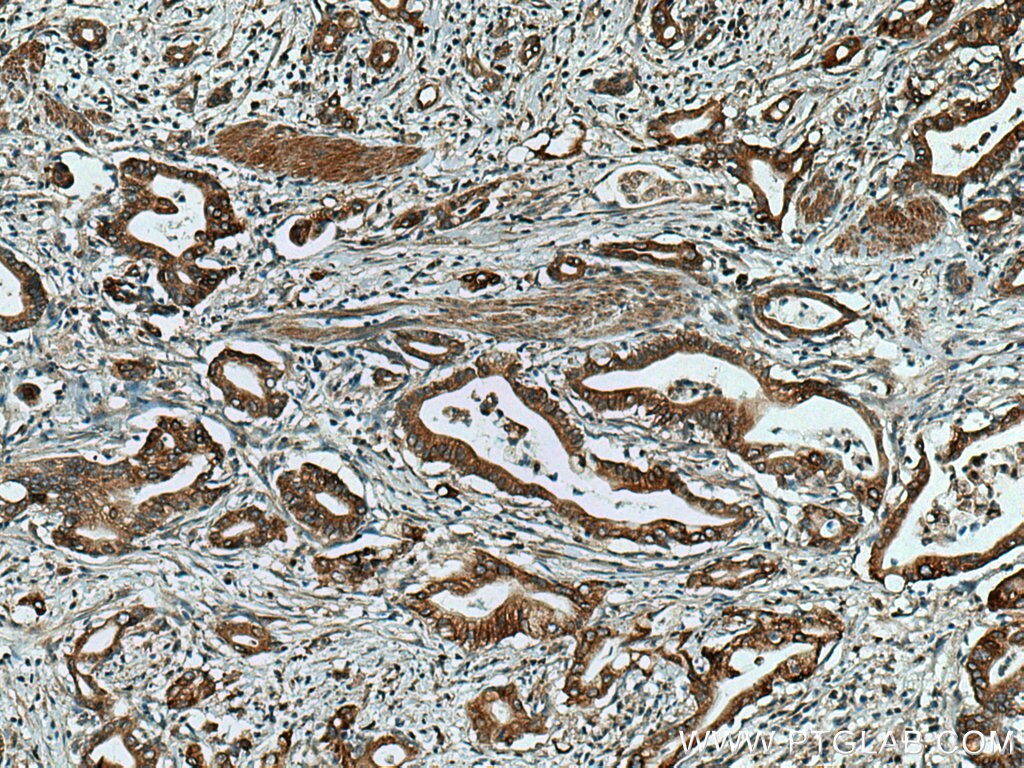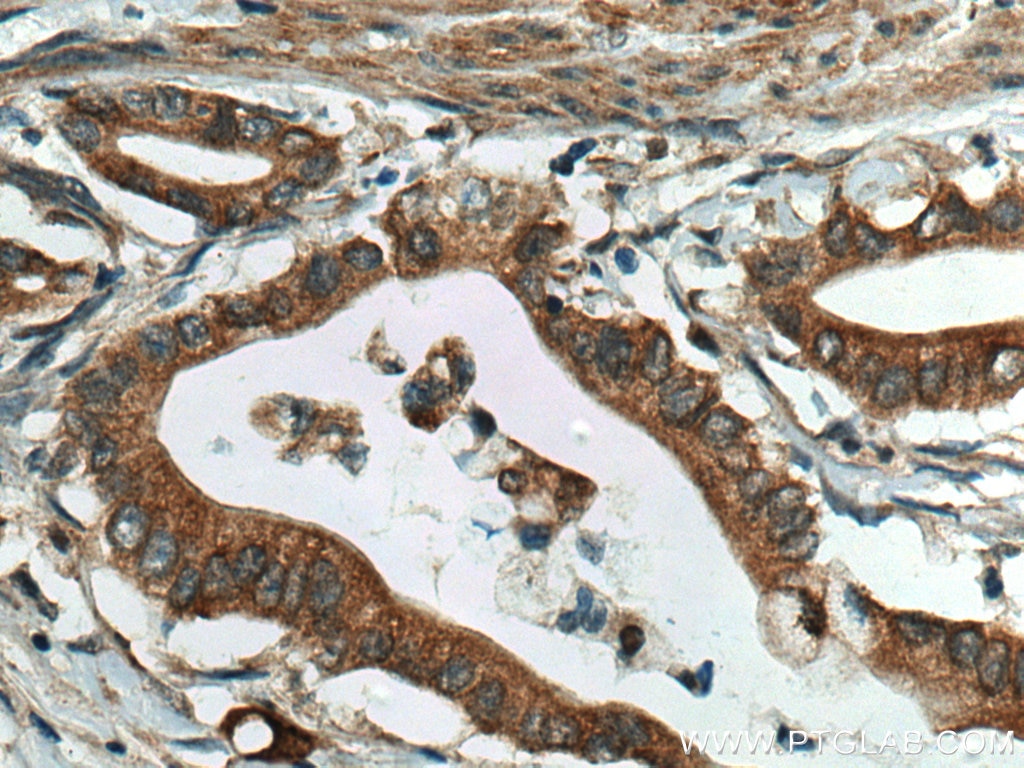ERO1L Polyklonaler Antikörper
ERO1L Polyklonal Antikörper für WB, IHC, ELISA
Wirt / Isotyp
Kaninchen / IgG
Getestete Reaktivität
human, Maus, Ratte und mehr (1)
Anwendung
WB, IF, IHC, ELISA
Konjugation
Unkonjugiert
Kat-Nr. : 12007-1-AP
Synonyme
Galerie der Validierungsdaten
Geprüfte Anwendungen
| Erfolgreiche Detektion in WB | Maus-Eierstockgewebe, A431-Zellen |
| Erfolgreiche Detektion in IHC | humanes Pankreaskarzinomgewebe Hinweis: Antigendemaskierung mit TE-Puffer pH 9,0 empfohlen. (*) Wahlweise kann die Antigendemaskierung auch mit Citratpuffer pH 6,0 erfolgen. |
Empfohlene Verdünnung
| Anwendung | Verdünnung |
|---|---|
| Western Blot (WB) | WB : 1:200-1:1000 |
| Immunhistochemie (IHC) | IHC : 1:50-1:500 |
| It is recommended that this reagent should be titrated in each testing system to obtain optimal results. | |
| Sample-dependent, check data in validation data gallery | |
Veröffentlichte Anwendungen
| WB | See 9 publications below |
| IHC | See 1 publications below |
| IF | See 1 publications below |
Produktinformation
12007-1-AP bindet in WB, IF, IHC, ELISA ERO1L und zeigt Reaktivität mit human, Maus, Ratten
| Getestete Reaktivität | human, Maus, Ratte |
| In Publikationen genannte Reaktivität | human, Hausschwein, Maus, Ratte |
| Wirt / Isotyp | Kaninchen / IgG |
| Klonalität | Polyklonal |
| Typ | Antikörper |
| Immunogen | ERO1L fusion protein Ag2620 |
| Vollständiger Name | ERO1-like (S. cerevisiae) |
| Berechnetes Molekulargewicht | 468 aa, 54 kDa |
| Beobachtetes Molekulargewicht | 54 kDa |
| GenBank-Zugangsnummer | BC008674 |
| Gene symbol | ERO1L |
| Gene ID (NCBI) | 30001 |
| Konjugation | Unkonjugiert |
| Form | Liquid |
| Reinigungsmethode | Antigen-Affinitätsreinigung |
| Lagerungspuffer | PBS mit 0.02% Natriumazid und 50% Glycerin pH 7.3. |
| Lagerungsbedingungen | Bei -20°C lagern. Nach dem Versand ein Jahr lang stabil Aliquotieren ist bei -20oC Lagerung nicht notwendig. 20ul Größen enthalten 0,1% BSA. |
Hintergrundinformationen
ERO1L, also named as ERO1-alpha, is an essential oxidoreductase that oxidizes proteins in the endoplasmic reticulum to produce disulfide bonds. It acts by oxidizing directly P4HB/PDI isomerase through a direct disulfide exchange. It does not act as a direct oxidant of folding substrate, but relies on P4HB/PDI to transfer oxidizing equivalent. Associates with ERP44 but not with GRP54, demonstrating that it does not oxidize all PDI related proteins and can discriminate between PDI and related proteins. Its reoxidation probably involves electron transfer to molecular oxygen via FAD. Glutathione may be required to regulate its activity in the endoplasmic reticulum. It may be responsible for a significant proportion of reactive oxygen species (ROS) in the cell, thereby being a source of oxidative stress. It is required for the folding of immunoglobulin proteins. Responsible for the release of the unfolded cholera toxin from reduced P4HB/PDI in case of infection by V.cholerae, thereby playing a role in retrotranslocation of the toxin. This antibody has no cross reaction to ERO1.
Protokolle
| Produktspezifische Protokolle | |
|---|---|
| WB protocol for ERO1L antibody 12007-1-AP | Protokoll herunterladen |
| IHC protocol for ERO1L antibody 12007-1-AP | Protokoll herunterladen |
| FC protocol for ERO1L antibody 12007-1-AP | Protokoll herunterladen |
| Standard-Protokolle | |
|---|---|
| Klicken Sie hier, um unsere Standardprotokolle anzuzeigen |
Publikationen
| Species | Application | Title |
|---|---|---|
Cancers (Basel) ER Stress Response and Induction of Apoptosis in Malignant Pleural Mesothelioma: The Achilles Heel Targeted by the Anticancer Ruthenium Drug BOLD-100 | ||
Cell Calcium Mannan-binding lectin deficiency augments hepatic endoplasmic reticulum stress through IP3R-controlled calcium release. | ||
J Virol Porcine circovirus 2 manipulates PERK-ERO1α axis of endoplasmic reticulum in favor of its replication by derepressing viral DNA from HMGB1 sequestration within nuclei. | ||
J Toxicol Oxidative Stress and the ER Stress Response in a Murine Model for Early-Stage Alcoholic Liver Disease. | ||
Transplantation Protective Effect of Calpain Inhibition During Cold Ischemia on Ischemia-reperfusion Injury After Lung Transplantation |
